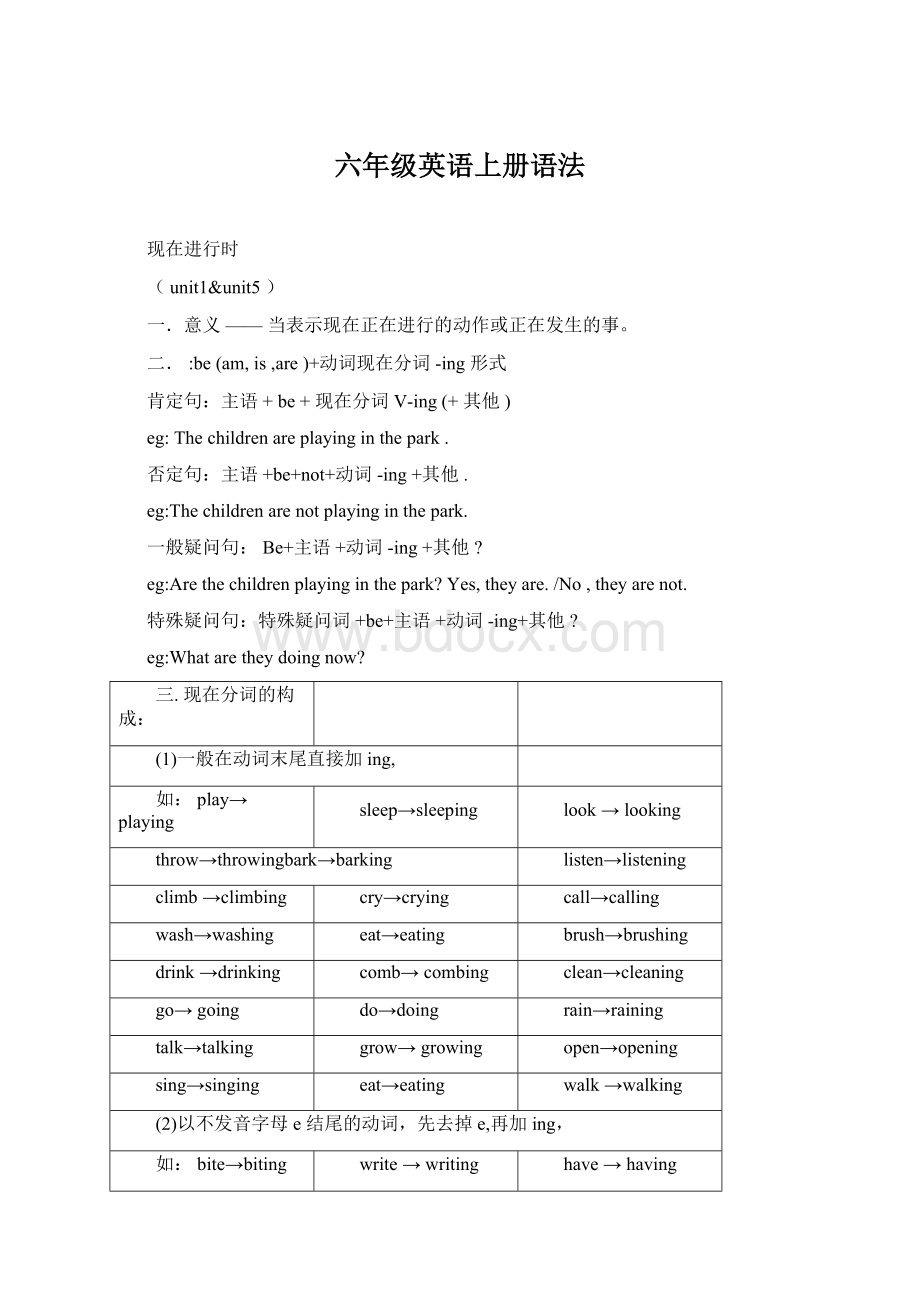六年级英语上册语法.docx
《六年级英语上册语法.docx》由会员分享,可在线阅读,更多相关《六年级英语上册语法.docx(16页珍藏版)》请在冰豆网上搜索。

六年级英语上册语法
现在进行时
(unit1&unit5)
一.意义——当表示现在正在进行的动作或正在发生的事。
二.:
be(am,is,are)+动词现在分词-ing形式
肯定句:
主语+be+现在分词V-ing(+其他)
eg:
Thechildrenareplayinginthepark.
否定句:
主语+be+not+动词-ing+其他.
eg:
Thechildrenarenotplayinginthepark.
一般疑问句:
Be+主语+动词-ing+其他?
eg:
Arethechildrenplayinginthepark?
Yes,theyare./No,theyarenot.
特殊疑问句:
特殊疑问词+be+主语+动词-ing+其他?
eg:
Whataretheydoingnow?
三.现在分词的构成:
(1)一般在动词末尾直接加ing,
如:
play→playing
sleep→sleeping
look→looking
throw→throwingbark→barking
listen→listening
climb→climbing
cry→crying
call→calling
wash→washing
eat→eating
brush→brushing
drink→drinking
comb→combing
clean→cleaning
go→going
do→doing
rain→raining
talk→talking
grow→growing
open→opening
sing→singing
eat→eating
walk→walking
(2)以不发音字母e结尾的动词,先去掉e,再加ing,
如:
bite→biting
write→writing
have→having
dance→dancing
(3)以重读闭音节结尾的动词,中间只有一个元音字母,词尾只有一个辅音字母,应双写末尾的辅音字母,再加ing,
如:
sittingrunningswimmingshopping
四.时间标志——now,句前的look,listen
现在进行时专项练习:
一、写出下列动词的现在分词:
play________
run__________
swim________eat__________go_________
write________sit___________
read________
have_________wash
sleep________look_________
throw________bark________
listen_________
climb________bite_______
cry_________clean
call_________
sit________
shop_________
brush
drink
comb
二、用所给的动词的正确形式填空:
1.Thechildren__________________(play)intheparknow.
2.Lingling_______________(sit)onaswingnow.
3.Mymother_________________(sit)onabenchnow.
4.What_____you______(do)now?
5.Look.He_______________(sleep).
6.Thedog____________(look)atthechildrennow.
7.Look!
Mingming________________(throw)stonesatthedog.
8.Whatisourgranddaughterdoing?
She_________(drink)water.
9.It’s5o’clocknow.We_____________supper(have)now.
10.______Helen____________(wash)clothes?
Yes,sheis
.
三、句型转换:
1.Theyaredoinghousework.(分别改成一般疑问句和否定句)
_____________________________________________________________
_____________________________________________________________
2.Thestudentsarecleaningtheclassroom.(改一般疑问句并作肯定和否定回答)
_________________________________________________________________
_________________________________________________________________
3.I’mplayingthefootballintheplayground.(对划线部分进行提问)
_________________________________________________________________
4.Tomislistening.(改为否定句)
_________________________________________________________________
一般现在时
(unit2)
一.意义
1.
表示事物或人物的特征、状态。
如:
Theskyisblue.
天空是蓝色的。
2.
表示经常性或习惯性的动作。
如:
Igetupatsixeveryday.
我每天六点起床。
3.
表示客观现实。
如:
Theearthgoesaroundthesun.
地球绕着太阳转。
二.构成及变化
1.be动词的变化。
肯定句:
主语+be(am,is,are)+其它。
如:
Iamaboy.我是一个男孩。
否定句:
主语+be+not+其它。
如:
Heisnotaworker.他不是工人。
一般疑问句:
Be+主语+其它。
如:
-Areyouastudent?
-Yes.Iam./No,I'mnot.
特殊疑问句:
疑问词+一般疑问句。
如:
Whereismybike?
2.行为动词的变化。
①当主语为第一,二人称及复数时,助动词为do
肯定句:
主语+动词原形(+其它)。
如:
Weoftenplaybasketballafterschool.否定句:
主语+don't+动词原形(+其它)。
如:
wedon’tplaybasketballafterschool.一般疑问句:
Do+主语+动词原形+其它?
如:
Doyouoftenplaybasketballafterschooll?
Yes,wedo./No,wedon't.特殊疑问句:
疑问词+以do开头的一般疑问句?
如:
Whatdoyouoftendoafterschool?
②当主语为第三人称单数时,助动词为does
肯定句:
主语+动词三单式(+其它)。
如:
Heswimswell.
否定句:
主语+doesn’t+动词原形(+其它)。
如:
Hedoesn’tswimwell..
一般疑问句:
Does+主语+动词原形+其它。
如:
Doesheswimwell?
Yes,hedoes./No,hedoesn't.
特殊疑问句:
疑问词+以does开头的一般疑问句?
如:
Howdoesyourfathergotowork?
三.第三人称单数的动词变化规则(只有在第三人称为主语的肯定句中,动词才用三单式)
(1)多数动词直接加
s:
如:
run→runsleave→leaves
get
→gets
wave→waves
like
→likeseat→eats
make→makes
clean→cleans
start→starts
take→takes
play
→plays
climb
→climbs
tell
→tells
say→says
look→looks
pick→picks
turn→turns
(2)结尾是s,x,sh,ch,o,前为辅音字母,结尾加
watch→watchesgo→goesdo→doeswash
es:
→washes
brush
→brushes
(3)动词末尾y前为辅音:
将y改为i加es:
study→studiesfly→fliescarry→carriescry→cries但在y前如果为元音则直接加s:
buyssays
(4)不规则变化
have→has
四.时间标志:
always,usually,often,sometimes,every,
一般现在时专项练习:
一、用括号内动词的适当形式填空。
1.Heoften________(have)dinnerathome.
2.DanielandTommy_______(be)inClassOne.
3.We_______(notwatch)TVonMonday.
4.Nick_______(notgo)tothezooonSunday.
5.______they________(like)theWorldCup?
6.What_______theyoften_______(do)onSaturdays?
7._______yourparents_______(read)newspaperseveryday?
8.Thegirl_______(teach)usEnglishonSundays.
9.SheandI________(take)awalktogethereveryevening.
10.There________(be)somewaterinthebottle.
11.Mike_______(like)cooking.
12.They_______(have)thesamehobby.
13.Myaunt_______(look)afterherbabycarefully.
14.Youalways_______(do)yourhomeworkwell.
15.I_______(be)ill.I’mstayinginbed.
16.She_______(go)toschoolfromMondaytoFriday.
17.LiuTao_______(do)notlikePE.
18.Thechildoften_______(watch)TVintheevening.
19.SuHaiandSuYang_______(have)eightlessonsthisterm.
20.-Whatday_______(be)ittoday?
-It’sSaturday.
二、按照要求改写句子。
1.DanielwatchesTVeveryevening.(改为否定句)
___________________________________________________
2.Idomyhomeworkeveryday.(改为一般疑问句,作否定回答)
________________________________________________________
3.Shelikesmilk.(改为一般疑问句,作肯定回答)
___________________________
4.Amylikesplayingcomputergames.(改为一般疑问句,作否定回答)
___________________________________________________
5.Wegotoschooleverymorning.改(为否定句)
_______________________________________________________
6.HespeaksEnglishverywell.(改为否定句)
___________________________________________________
7.Iliketakingphotosinthepark.(对划线部分提问)
________________________________________________________
8.JohncomesfromCanada对.(划线部分提问)
___________________________________________________
9.Sheisalwaysagoodstudent改.(为一般疑问句,作否定回答)
________________________________________________________
10.SimonandDaniellikegoingskating.(改为否定句)
___________________________________________________
三、改错(划出错误的地方,将正确的写在横线上)
1.IsyourbrotherspeakEnglish?
__________________
2.Doeshelikesgoingfishing?
__________________
3.Helikesplaygamesafterclass.__________________
4.Mr.WuteachsusEnglish.__________________
5.Shedon’tdoherhomeworkonSundays._________________
一般过去时
(unit4)
一.意义:
一般过去时表示过去某个时间发生的动作或存在的状态,常和表示过去的时间状语连用。
二.构成及变化
1.Be动词在一般过去时中的变化:
⑴am和is在一般过去时中变为was。
(wasnot=wasn’t)
⑵are在一般过去时中变为were。
(werenot=weren’t)
⑶带有was或were的句子,其否定、疑问的变化和is,am,are一样,即否定句在was或were后加not,一般疑问句把was或were调到句首。
2.句中没有be动词的一般过去时的句子
否定句:
didn’t+动词原形,如:
Jimdidn’tgohomeyesterday.
一般疑问句:
在句首加did,句子中的动词过去式变回原形。
如:
DidJimgohome
yesterday?
特殊疑问句:
⑴疑问词+did+主语+动词原形?
如:
WhatdidJimdoyesterday?
⑵疑问词当主语时:
疑问词+动词过去式?
如:
Whowenttohomeyesterday?
三.动词过去式变化规则:
1.一般在动词末尾加-ed,如:
want→wanted
miss→missedlook→lookedask→asked
talk→talked
kill→killed
stay→stayedjump→jumped
2.结尾是
e加
d,如:
taste-tasted
3.末尾只有一个元音字母(a.e.i.o.u)和一个辅音字母的重读闭音节,应双写末尾的辅音字母,再加-ed,如:
stop-stopped
4.以“辅音字母+y”结尾的,变y为i,再加-ed,
如:
study-studied
try→tried
worry→worried
5.不规则动词过去式:
am/is→was
are→were
do→did
see→saw
say→said
give→gave
fly→flew
sit→sat
have→had
feel→felt
have→had
go→went
get→got
come→came
eat→ate
take→took
run→ran
sing→sang
put→put
make→made
read→read
write→wrote
drink→drank
ride→rode
draw→drew
speak→spoke
bring→brought
过去时专项练习:
一.写出下列动词的过去式
is\am_________fly_______
plant________
are________
drink_________
play_______
go________
make________does_________dance________
worry________
ask_____
taste_________
eat__________draw________
put______
throw________kick_________
pass_______
do________
二、用动词的适当形式填空。
1.It______(be)Ben
’sbirthdaylastFriday.
2.Weall______(have)agoodtimelastnight.
3.He________(jump)highonlastSportsDay.
4.Helen________(milk)acowonFriday.
5.Shelikes______newspapers,butshe______abookyesterday.(read)
6.He_______footballnow,butthey_______basketballjustnow.(play)
7.Jim’smother_________(plant)treesjustnow.
8._______they________(sweep)theflooronSunday?
No,they_____.
9.I_______(watch)acartoononMonday.
10.We___________(go)toschoolonSunday.
11.It_____(be)the2ndofNovemberyesterday.MrWhite________(go)tohisofficeby
car.
12.GaoShan________(put)thebookonhisheadamomentago.
13.Don’t______thehouse.Mum_______ityesterday.(clean)
14.What____you______justnow?
I_______somehousework.(do)
15.They_________(make)akiteaweekago.
16.Iwantto______apples.Butmydad_______allofthemlastmonth.(pick)
17._______he______theflowersthismorning?
Yes,he_____.(water)
18.She____(be)aprettygirl.Look,she_____(do)Chinesedances.
19.Thestudentsoften_________(draw)somepicturesintheartroom.
20.What______Mikedoonthefarm?
He________cows.(milk)
21.I______anEnglishteachernow.
22.She_______happyyesterday.
23.They_______gladtoseeeachotherlastmonth.
24.HelenandNancy________goodfriends.
25.Thelittledog_____twoyearsoldthisyear.
26.Look,there________lotsofgrapeshere.
27.There________asignonthechaironMonday.
28.Today_____thesecondofJune.Yesterday______thefirstofJune.It_____ChildrenDay.Allthestudents______veryexcited